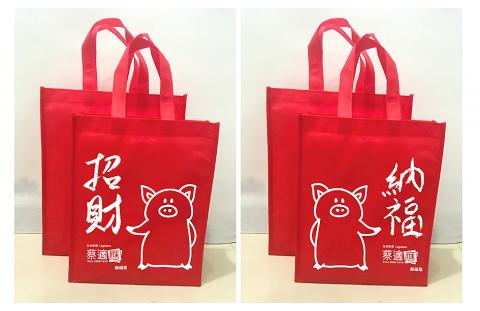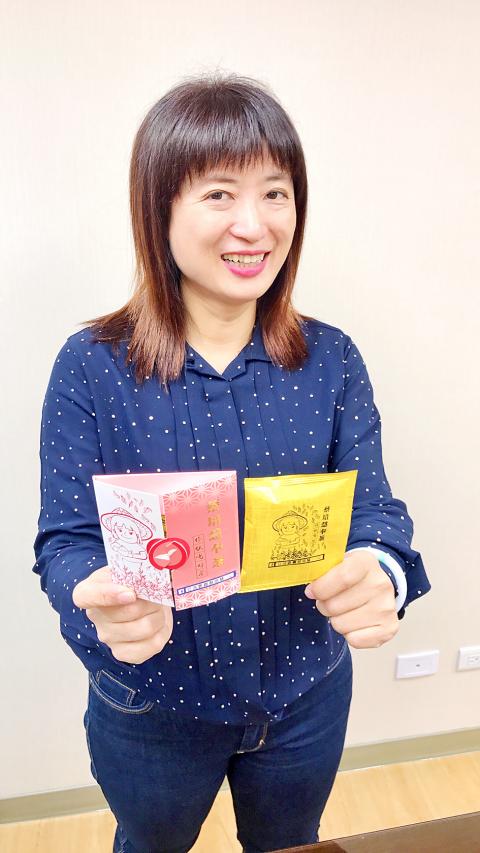Distributing or selling Lunar New Year holiday items to raise campaign funds is a time-honored tradition for Taiwanese politicians, but this year several lawmakers said their products are designed to highlight special causes.
Democratic Progressive Party (DPP) Legislator Frida Tsai (蔡培慧) chose teabags filled with Taiwan-grown Assam tea to highlight her rural roots and farm-worker activism.
The type of leaf she chose is Tea Research and Extension Station No. 8, which is grown in her native Nantou County, she said.

Photo: Su Fun-her, Taipei Times
“Growing up in a village, I served tea to friends and guests, and it was a very important social ritual,” she said, adding that promoting agriculture from her home county is never far from her thoughts.
She became executive secretary of the Executive Yuan’s 921 Earthquake Relief Foundation to help rebuild the county, and during her tenure, she worked closely with foundation executive director Hsieh Chih-cheng (謝志誠) to create a farmer’s market, held the following Lunar New Year, she said.
She served a lot of tea to the farmers taking part in the market, she added.

Photo: Su Fun-her, Taipei Times
A vibrant and sustainable local economy is crucial and rebuilding Nantou’s agriculture is part of that process, she added.
DPP Legislator Chao Tien-lin (趙天麟), who represents a district in Kaohsiung, is selling specially designed spring couplets (春聯) with the chance of winning chicken eggs, as high-quality chicken eggs are in high demand over the holiday.
Donors who buy a couplet set would be eligible for a lottery for eggs from Agriculture Certified Agricultural Standards-approved farms, he said.
However, they would have to take a photograph of the couplets pasted on their doorways and upload the photos to his official Facebook page, then visit his office and tag their visit on Facebook, he said.
DPP Legislator Tsai Shih-ying (蔡適應), who represents a Keelung district, said a poll he conducted found that politicians’ spring couplets are not really that popular with the public.
For his supporters, he decided on a red shopping bag illustrated with a pig and a sample of his calligraphy that reads zhao cai (招財, “welcoming prosperity”), he said.
The bag has been a success with homemakers, he said.
Many Chinese Nationalist Party (KMT) lawmakers sought to make connections to Kaohsiung Mayor Han Kuo-yu (韓國瑜) with their items, such as Kaohsiung-born KMT Legislator Arthur Chen (陳宜民), who represents a Taipei district.
His couplets bear Han’s campaign slogan, “Kaohsiung Will Get Rich” (高雄發大財).
KMT Legislator Lin Yi-hua (林奕華) said her office was conducting an online lottery to give away 3,000 bags of “lucky money” blessed by the Temple of the Gods of Wealth in New Taipei City’s Jinshan District (金山).
KMT Legislator Lee Yen-hsiu (李彥秀), who represents a Taipei district, said she wanted to avoid cliches so her office prepared chocolate gold coins that donors could use as lucky charms or eat.
KMT Legislator Hsu Shu-hua (許淑華), whose constituency is also in Nantou County, is selling calendars featuring photographs of herself, at NT$500 apiece, with the money to go to children’s welfare.
Hsu was Miss Republic of China in 1996.

Chinese spouse and influencer Guan Guan’s (關關) residency permit has been revoked for repeatedly posting pro-China videos that threaten national security, the National Immigration Agency confirmed today. Guan Guan has said many controversial statements in her videos posted to Douyin (抖音), including “the red flag will soon be painted all over Taiwan” and “Taiwan is an inseparable part of China,” and expressing hope for expedited reunification. The agency last year received multiple reports alleging that Guan Guan had advocated for armed reunification. After verifying the reports, the agency last month issued a notice requiring her to appear and explain her actions. Guan

The Kaohsiung Tourism Bureau audited six hotels in an effort to prevent price gouging ahead of Korean band BTS’ concert tour in the city scheduled for Nov. 19, 21 and 22 this year. The bureau on Friday said that the audits — conducted in response to allegations of unfair pricing posted on social media — found no wrongdoing. These establishments included the local branches of Chateau de Chine, Hotel Nikko, My Humble House, and Grand Hai Lai, it said, adding that the Consumer Protection Commission would have penalized price gougers had the accusations been substantiated. The bureau said the Tourism Development Act

GIVE AND TAKE: Blood demand continues to rise each year, while fewer young donors are available due to the nation’s falling birthrate, a doctor said Blood donors can redeem points earned from donations to obtain limited edition Formosan black bear travel mugs, the Kaohsiung Blood Center said yesterday, as it announced a goal of stocking 20,000 units of blood prior to the Lunar New Year. The last month of the lunar year is National Blood Donation Month, when local centers seek to stockpile blood for use during the Lunar New Year holiday. The blood demand in southern Taiwan — including Tainan and Kaohsiung, as well as Chiayi, Pingtung, Penghu and Taitung counties — is about 2,000 units per day, the center said. The donation campaign aims to boost

BACK TO WINTER: A strong continental cold air mass would move south on Tuesday next week, bringing colder temperatures to northern and central Taiwan A tropical depression east of the Philippines could soon be upgraded to be the first tropical storm of this year, the Central Weather Administration (CWA) said yesterday, adding that the next cold air mass is forecast to arrive on Monday next week. CWA forecaster Cheng Jie-ren (鄭傑仁) said the first tropical depression of this year is over waters east of the Philippines, about 1,867km southeast of Oluanpi (鵝鑾鼻), and could strengthen into Tropical Storm Nokaen by early today. The system is moving slowly from northwest to north, and is expected to remain east of the Philippines with little chance of affecting Taiwan,